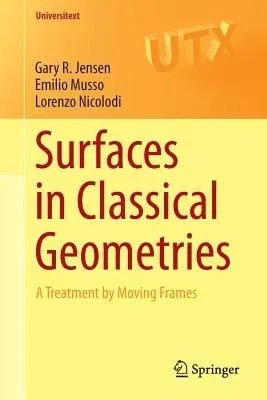Designed for intermediate graduate studies, this text will broaden
students' core knowledge of differential geometry providing foundational
material to relevant topics in classical differential geometry. The
method of moving frames, a natural means for discovering and proving
important results, provides the basis of treatment for topics discussed.
Its application in many areas helps to connect the various geometries
and to uncover many deep relationships, such as the Lawson
correspondence. The nearly 300 problems and exercises range from simple
applications to open problems. Exercises are embedded in the text as
essential parts of the exposition. Problems are collected at the end of
each chapter; solutions to select problems are given at the end of the
book. Mathematica(R), Matlab(TM), and Xfig are used to illustrate
selected concepts and results. The careful selection of results serves
to show the reader how to prove the most important theorems in the
subject, which may become the foundation of future progress.
The book pursues significant results beyond the standard topics of an
introductory differential geometry course. A sample of these results
includes the Willmore functional, the classification of cyclides of
Dupin, the Bonnet problem, constant mean curvature immersions,
isothermic immersions, and the duality between minimal surfaces in
Euclidean space and constant mean curvature surfaces in hyperbolic
space. The book concludes with Lie sphere geometry and its spectacular
result that all cyclides of Dupin are Lie sphere equivalent. The
exposition is restricted to curves and surfaces in order to emphasize
the geometric interpretation of invariants and other constructions.
Working in low dimensions helps students develop a strong geometric
intuition. Aspiring geometers will acquire a working knowledge of curves
and surfaces in classical geometries. Students will learn the invariants
of conformal geometry and how these relate to the invariants of
Euclidean, spherical, and hyperbolic geometry. They will learn the
fundamentals of Lie sphere geometry, which require the notion of
Legendre immersions of a contact structure. Prerequisites include a
completed one semester standard course on manifold theory.

